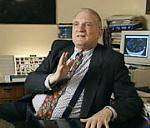

INTERVIEW OF THE WEEK
Eric Carlson, Ph.D., senior astronomer emeritus, Adler Planetarium,
Chicago.
 QuickTime Video Clip (1.9 mb download) CARLSON: ... this is an incredibly, highly ordered event, extremely highly ordered—and it's just the opposite of a chaotic event. FRED: Which brings up the question: Where did it get its initial order? CARLSON: Yeah, exactly. And see, that's part of the primal mystery. |
For this interview, Day Star’s president, Fred Heeren, visited Eric
Carlson at Chicago’s Adler Planetarium. Here’s a portion of their conversation
regarding the fine-tuning of the many cosmic parameters:
CARLSON: When you look at the fundamental constants of nature, and see how they interlock, and especially when you start just for fun—I think, they started out to do it this way—they said, “Well what would happen suppose we made the gravitational constant, just a little different,” out to the 5th decimal place or something, and tried this with the other parts of nature, and discovered that the whole thing, the possibility of life at least falls apart, right away. So this led to the idea of the anthropic principle, the whole idea that it's all done to sort of make us possible and so on.... I just regard this as this glaring mystery that we have to face, and we don't have an answer for it.
HEEREN: If we see things as orderly and unified today, if you extrapolate back far enough and we look at the big bang, the big bang itself must have been, not a random explosion, which is the way most people think of it—
CARLSON: That's true. It—
HEEREN: —it's called “big bang,” after all. Is it accurate to call it the big bang, or is that just what caught on?
CARLSON: No, it's really not. In fact, I'm so glad you brought that up. Because ... this is an incredibly, highly ordered event, extremely highly ordered—and it's just the opposite of a chaotic event.
HEEREN: Which brings up the question: Where did it get its initial order?
CARLSON: Yeah, exactly. And see, that's part of the primal mystery. And that's what you run up against no matter where you turn, or how hard you push.... I don't see science as here to explain everything—it's here to help us give us orientation, in the midst of a very great mystery. I just let my mind reel before all of this, and I honor the mystery. And I honor our efforts to understand those parts of it which we can.
You'll find the whole history of these twentieth century cosmological discoveries, and the
bigger implications for everyday life, in Day Star's new book, Show
Me God.
DAY STAR’S DISCUSSION KICKER OF THE WEEK:
Fred Hoyle coined the name “big bang” to ridicule the idea in
a radio address long ago. Given astronomer Eric Carlson’s comments above, might we
come up with a better name now? Others have tried and failed to come up with anything as
catchy as “big bang.” But I wonder if it also suited those who wanted to convey
a sense of randomness about the event, which is a meaning that opposes the facts as we now
know them. Can’t we come up with something nearly as catchy and much more accurate?
How about instead calling it “the flying start,” or “the ordering,” or
the “big birth”? Any other ideas? Or do you still prefer to think of it as a
random, chance event?
Go to the Discussion Forum